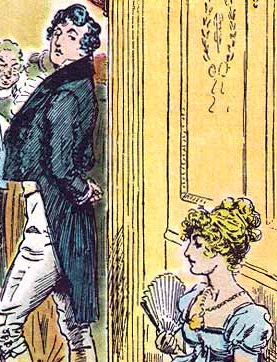Hello everyone! I’m Hannah, and am a senior with an English major/Journalism minor. I love to read, listen to music, write, and look at houses. My favorite author is Cormac McCarthy, and his book Blood Meridian is awesome, especially if you’re into U.S. History and violent storylines.
This week’s excerpts from Fordyce’s “Sermons to Young Women” had marked comparisons to Austen’s Pride and Prejudice. I’ve taken to analyzing Sermon V, which focuses on female virtue, friendship, and conversation. While reading Fordyce’s warning on woman’s ability in wit and taking wit over “dulness and insipidity, moroseness and rigour” (397), I immediately thought about Mr. Darcy and Elizabeth.
Elizabeth is bold. She is incredibly witty, snarky, and intelligent, which gets her into some trouble (see her refuse Mr. Collins’ proposal here). Mr. Darcy recognizes Elizabeth’s intelligence in wit, and seems to like her more for it. It gives him a chance to feel challenged amidst rigid social hierarchy and careful manners.
While Fordyce does approve of wit, he warns against its misuse or “folly,” favoring modesty over self conceit. Sometimes, Elizabeth is too witty. Wit becomes snark, which in turn becomes an aid to prejudice and rudeness. As readers, we see Elizabeth’s hardheadedness in addition to her wit.
approve of wit, he warns against its misuse or “folly,” favoring modesty over self conceit. Sometimes, Elizabeth is too witty. Wit becomes snark, which in turn becomes an aid to prejudice and rudeness. As readers, we see Elizabeth’s hardheadedness in addition to her wit.
At the second ball, Darcy and Elizabeth have a verbal spar. After rebuking him for not speaking to her during the dance, Elizabeth mocks the profundity that should be found in speech, while drawing comparison to her and Darcy’s “unsocial, taciturn disposition” (Austen 124) in public setting. This seems like a revolt against Fordyce’s expectation for women to say something proverbial or overly poignant.
Elizabeth says a few zingers to Darcy, but this is one that stood out to me:
I do not think we were speaking at all. Sir William could not have interrupted any two people in the room who had less to say for themselves.—We have tried two or three subjects already without success, and what we are to talk of next I cannot imagine. (Austen 125)
Yes, the exchange is witty. Wit is good. However, it is also bold, biting, and openly rude. It would not be Fordyce approved.

Hannah, I really like your bringing in how “hardheaded” Lizzie is. I feel like that’s an aspect of her personality that is often overlooked until it becomes particularly relevant as a plot point. In the passage you pointed out we get a pretty clear image of Lizzie as the “critic” that Fordyce says every wit is “by profession” (400). What I think really subverts Foryce’s sermons in the Darcy-Lizzie situation is that Darcy is still falling for Elizabeth, not in spite of her Fordyce-denounced qualities, but because of them.
Hannah, I think you brought up some really good points. Your layout of the post is also very aesthetically pleasing (not that that’s relevant, but you did a nice job). I definitely agree that when Elizabeth presents her wittiness and snakiness to Mr. Darcy, he himself feels challenged by the societal rules. I also really agree with the idea that we as readers see Elizabeth’s extreme hard-headedness and this stubbornness makes her a very likable character.